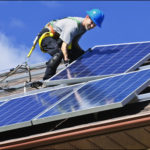 by Emilio Jaksetic
by Emilio Jaksetic
Virginia law (Virginia Code, Section 67-701 ) makes it easier for owners to consider installing solar panels on their property by limiting the ability of community associations to prohibit or restrict the installation of solar panels on the owner’s property. While the statute is likely to encourage the use of solar panels by property owners, there are some things that should be considered by property owners, community associations, and local government officials.
First, community associations in Virginia should get legal advice about the scope and applicability of Section 67-701 before trying to prohibit or restrict an owner from installing a solar panel on the owner’s property. (The relevant definition of “community association” is provided by Section 67-700.)
Second, owners should not rush to install solar panels on their property, and community associations should not rush to install solar panels on the common areas of their community, without considering the following:
(1) the pros and cons of solar panels relevant to their particular situation;
(2) the need to get building and/or inspection permits before having a solar panel installed;
(3) the need to get new building and/or inspection permits when a solar panel has to be removed to allow for repair or replacement of a roof and then is reinstalled;
(4) how to find a company that is licensed, bonded, insured and qualified to install or repair a solar panel;
(5) whether solar panels are covered by their homeowners or other property insurance, and whether there are any exceptions or qualifications to such insurance coverage;
(6) the total life cycle costs of purchasing, installing, operating, maintaining, repairing, replacing and disposing of solar panels;
(7) the risks of damage to solar panels by weather, animals, or other pests;
(8) the pros and cons and risks associated with battery storage connected to solar panels; and
(9) whether damaged or obsolete solar panels are classified as hazardous e-waste requiring special handling and disposal.
Third, community associations also need to consider whether installing solar panels in common areas raises any issues or problems for them because of the legal duties and responsibilities of the community association.
Fourth, state and local government officials need to consider whether they should regulate the disposal and recycling of solar panels. Although most of the components of a solar panel can be recycled, solar panels can contain dangerous materials such as arsenic, cadium, gallium, lead, and others that can qualify as hazardous waste.
Fifth, fire fighters and first responders need to be educated, trained, and equipped to deal with the hazards associated with damaged solar panels, improper battery storage, and toxic fumes generated by burning or fire-damaged solar panels. And, communities need to plan for the added taxpayer-funded expenses associated with these additional requirements.
This article is offered for informational and discussion purposes only. Anyone considering whether to install and use solar panels should seek advice and assistance from competent, qualified professionals before acting. Installing, repairing, and disposing of solar panels should not be done by unqualified people. The potential legal issues may warrant seeking advice from a licensed attorney. The potential insurance issues warrant a consultation with your insurance company. The references listed below are illustrative, and not exhaustive.
Safety issues for firefighters and first responders:
“The fire captain teaching solar and battery literacy for first responders” (November 2, 2020).
Matt Piantesdosi & Tony Granato, “Solar Photovoltaic (PV) Fire Safety Training” (slide presentation, 190 frames)
Nick Gromicko, “Solar panel fires and electrical hazards.”
Life-cycle, recycling and disposal of solar panels
Northeast Recycling Council, “The opportunities of solar panel recycling” (January 29, 2019)
Solar Energy Industries Association, “PV End-of-Life Management” (September 2019)
Tiffany Duong, “Solar panels are starting to die. Will we be able to recycle the e-waste?” (August 30, 2020)
Maddie Stone, “Solar panels are starting to die, leaving behind toxic trash” (August 22, 2020)
Bill Wertz, “Solar panels produce tons of toxic waste — literally,” (November 18, 2019)
Emilio Jaksetic, a retired lawyer, is a Republican in Fairfax County.


